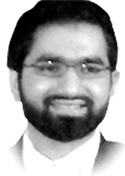From Disco Maulvi to Liberal Fascist

By M Bilal Lakhani
February 26, 2015
The writer is the recipient of the James A Wechsler Award for International Reporting and a graduate of Columbia University’s Graduate School of Journalism
“What’s the point of wearing a headscarf, if she’s going to roam around campus wearing tight jeans like that?” remarked a not-so-conservative friend, while referring to his former crush, after she turned him down. This was LUMS 10 years ago, a campus which shaped and transformed my worldview and those of countless others. I had grown up in Saudi Arabia with a clear worldview before coming to LUMS; more religion was the answer to any problem in society, or for that matter any personal problem. The campus was a strange place initially because for the first time in my life, I met people who disagreed with my point of view. This led to some funny conversations and observations.
For example, I was startled one day, when a political science instructor who was pro-secularism in his classes, stood next to me while praying at the mosque. When he first used the ‘S’ word in class, I felt sorry for him because I judged that he would end up in hell. In hindsight, this appears to be a childish or ignorant observation but for someone so well-indoctrinated in his worldview, imagining a secular man praying was a revealing moment. Exposure to different ideas was the first trigger for the evolution of my worldview. The second trigger was the surge of violence in the name of religion. How can Muslims kill Muslims is a question that I struggle with to this day.
When I asked religious folks for an answer to this question, they responded with denial (Muslims can’t kill Muslims), a conspiracy theory (it’s a Jewish/Indian conspiracy to divide us) or a lecture to focus on what’s really important in religion (praying, fasting) and not get engaged in politics of any sort. These answers made me restless. I started to consult academic sources and reading up on solutions from liberals.
This is when the pendulum of my worldview began to swing. From more religion being the answer to every problem, forcefully imposing your religious views on others became the source of all problems. This led to another conflict: I still believed religion was the answer to problems in my personal life. But I no longer believed that more religion was the only answer to the social or political problems facing the country. In fact, militants claiming to impose religion on the country at gun point were the problem. When I took this position publicly, I was told I was a hypocrite for changing my worldview. There was a phrase used to describe people with views like mine: liberal fascist. This made me angry. I began to drown out rational voices from the religious right; they’re all apologists, I argued. They aren’t part of the problem, they are the problem. My worldview hardened again. I stopped listening to conflicting voices.
Nearly a decade after I joined LUMS, I started a new experiment recently. I promised to start listening to people who had a worldview different than mine — starting with my parents who are still in Saudi Arabia. Instead of judging ideas and dismissing people on the basis of a pre-conceived label, I began to evaluate ideas on their own merit. I realised that the truth is far more nuanced than the frameworks we use to understand it. Our labels — liberal fascist, ‘Taliban Khan’ — don’t just help us frame problems. Over time, they become the invisible stumbling blocks to actually arriving at a solution. Not everyone has the opportunity to be exposed to different worldviews. We shouldn’t hold this against them. Besides, my liberal fascist worldview — whatever that means — is starting to pivot again too.
We’re all searching for that one overarching magic pill or solution out there that will solve all our problems. Society is so polarised these days — you are either with us or against us — that we feel the need to pick sides. Then we harden our positions and stop listening to conflicting points of view. What should one do in this situation? Don’t be afraid of having a worldview. Be afraid of believing that only your worldview has the solution to all our problems.
M Bilal Lakhani is the recipient of the James a Wechsler Award for International Reporting and a graduate of Columbia University’s Graduate School of Journalism
Source: http://tribune.com.pk/story/844215/from-disco-maulvi-to-liberal-fascist/




 Moderate Islamist here
Moderate Islamist here


0 comments:
Post a Comment